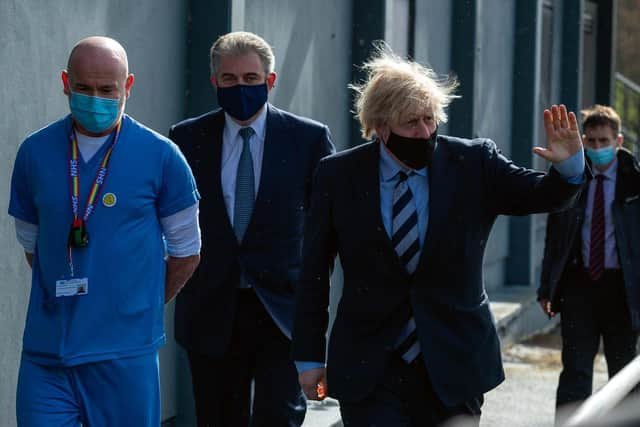PM Boris Johnson holds ‘frank’ conversations with DUP on NI visit
and live on Freeview channel 276
Extra checks on goods passing through its ports from the rest of the UK following Brexit have angered unionists.
Mr Johnson toured a mass vaccination centre in Arlene Foster’s Co Fermanagh constituency.
Advertisement
Hide AdAdvertisement
Hide AdHe was joined by the DUP leader and Stormont Health Minister Robin Swann at the converted Lakeland Forum leisure centre in Enniskillen.


Mrs Foster urged him to “stand up for Northern Ireland” and ditch the “intolerable” Protocol governing Irish Sea trade post-Brexit.
She said he had been in “listening mode” and “alive to the issues”.
The First Minister said: “Not a single unionist party in Northern Ireland supports this unworkable Protocol.
Advertisement
Hide AdAdvertisement
Hide Ad“Rather than protect the Belfast Agreement and its successor agreements, the Protocol has created societal division and economic harm.
“Whilst grace periods have been extended unilaterally, we need a permanent solution so business can plan and the integrity of the United Kingdom internal market can be restored.”
She told the Prime Minister a local school in Fermanagh was unable to order trees from England due to red tape surrounding the transport of soil.
Mrs Foster’s powersharing partner, Sinn Fein’s deputy First Minister Michelle O’Neill, refused to welcome the premier to Belfast on Friday in her Stormont role after a request for a political meeting with her and Sinn Fein leader Mary Lou McDonald was not accepted.
Advertisement
Hide AdAdvertisement
Hide AdStormont’s leaders are deeply divided over the wisdom of Brexit and the Protocol.
The Protocol was agreed by the EU and UK during the withdrawal negotiations to prevent a hard border on the island of Ireland.
It achieves that by keeping Northern Ireland in the EU single market for goods, with regulatory checks and inspections now required on agri-food produce moving into the region from the rest of the UK.
The new arrangements have caused some disruption to trade since the start of the year as firms have struggled with new processes and administration.
Advertisement
Hide AdAdvertisement
Hide AdUnionists are opposed to the protocol, claiming it undermines Northern Ireland’s place in the UK internal market.
Nationalists acknowledge teething problems with the new arrangements but argue that they can be finessed.
Mr Johnson also visited RAF Aldergrove in Co Antrim on Friday.
He is due to hold further engagements later.
Northern Ireland’s centenary programme marking the anniversary of the state’s foundation will champion young people of the future, Mr Johnson said.
Advertisement
Hide AdAdvertisement
Hide AdIt will also pay tribute to those who worked tirelessly to support the region during the pandemic, he added.
Plans for 2021 include a major business showcase in London, a £1 million Shared History Fund, an ambitious programme for young people, tree-planting projects, academic and historic events and an international church service for all denominations.
Mr Johnson said 2021 “marks 100 years since the creation of Northern Ireland, which has paved the way for the formation of the UK as we know it.
“Our centenary programme will reflect on the past and on the people and developments that make Northern Ireland the great place it is today.”
Advertisement
Hide AdAdvertisement
Hide AdNationalists and unionists hold sharply differing views of the history of Northern Ireland: on its past governance and public representation; the security situation including decades of conflict; seismic events like the Second World War or the civil rights movement; and over issues like public housing, freedom to demonstrate and equal voter representation.
---
A message from the Editor:
Thank you for reading this story on our website. While I have your attention, I also have an important request to make of you.
With the coronavirus lockdown having a major impact on many of our advertisers — and consequently the revenue we receive — we are more reliant than ever on you taking out a digital subscription.
Subscribe to newsletter.co.uk and enjoy unlimited access to the best Northern Ireland and UK news and information online and on our app. With a digital subscription, you can read more than 5 articles, see fewer ads, enjoy faster load times, and get access to exclusive newsletters and content. Visit https://www.newsletter.co.uk/subscriptions now to sign up.
Advertisement
Hide AdAdvertisement
Hide AdOur journalism costs money and we rely on advertising, print and digital revenues to help to support them. By supporting us, we are able to support you in providing trusted, fact-checked content for this website.
Alistair Bushe
Editor
Comment Guidelines
National World encourages reader discussion on our stories. User feedback, insights and back-and-forth exchanges add a rich layer of context to reporting. Please review our Community Guidelines before commenting.